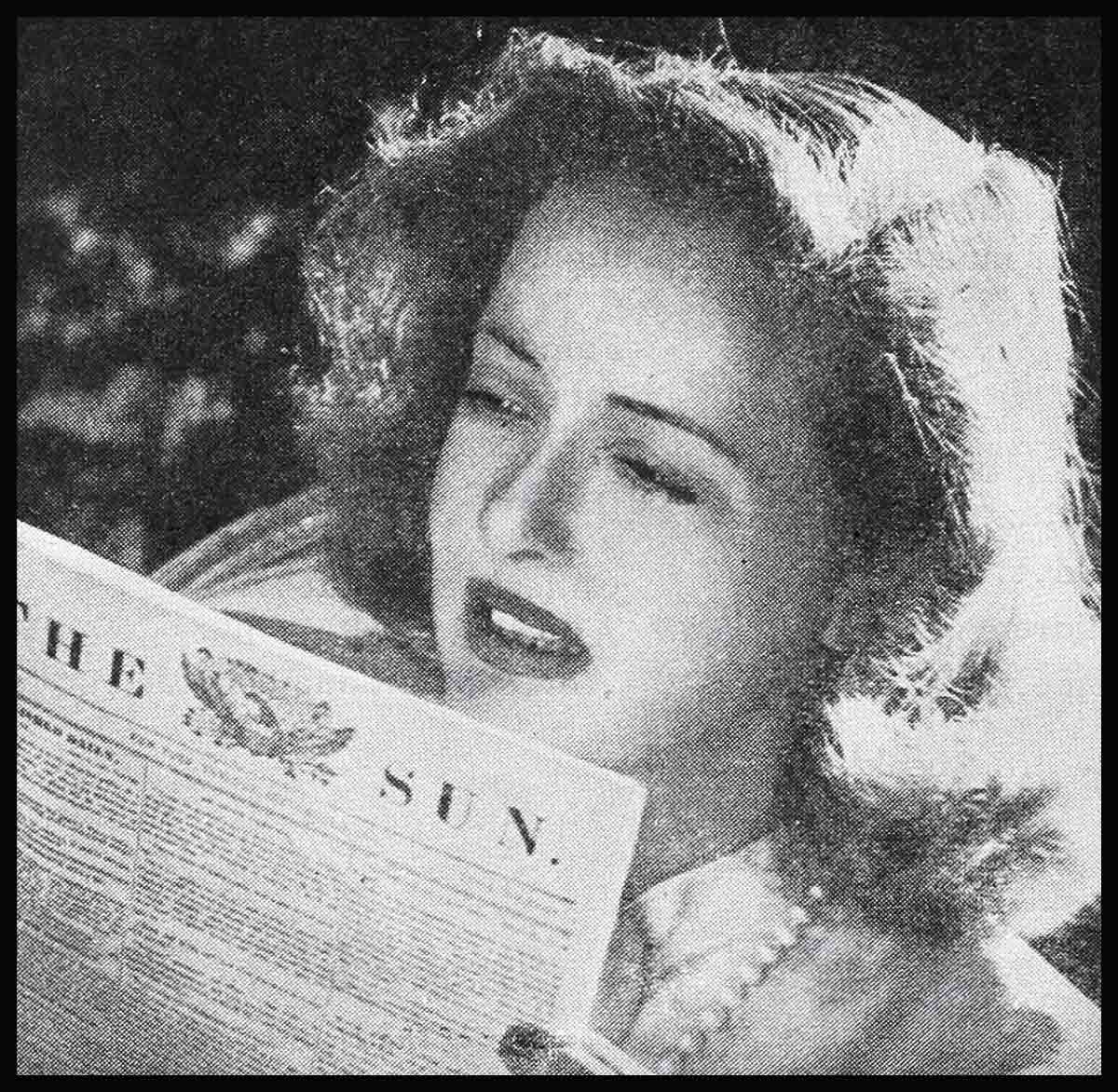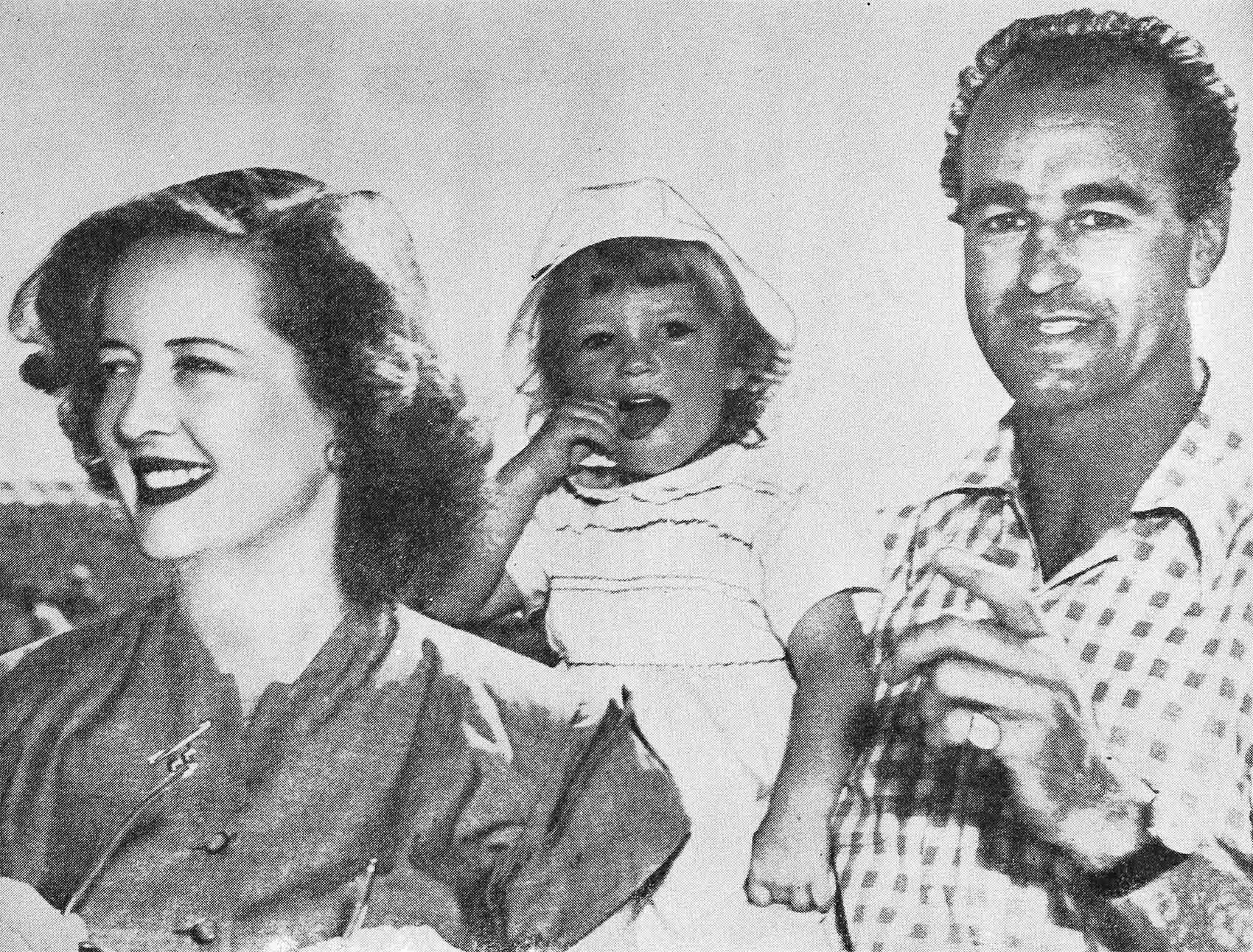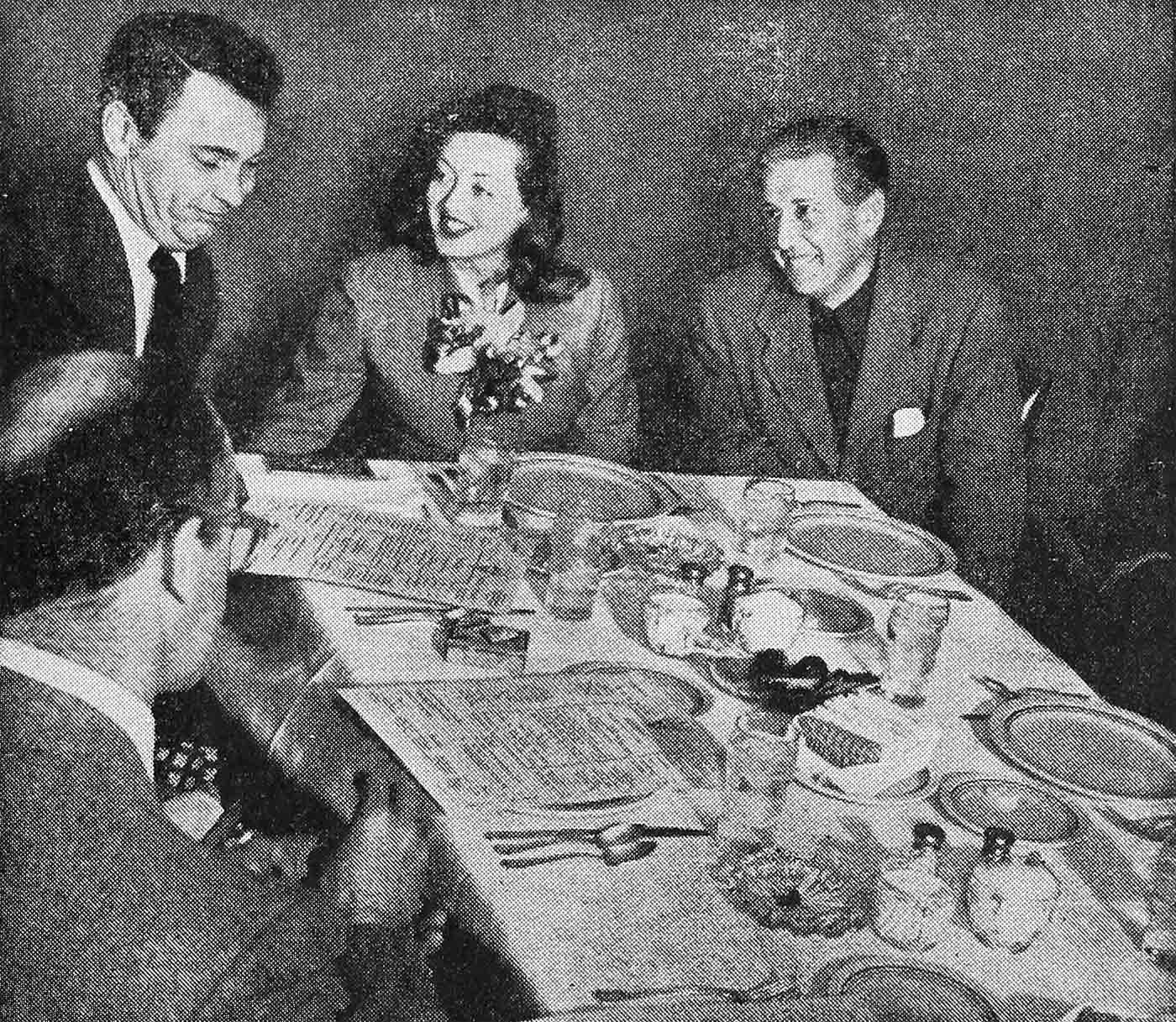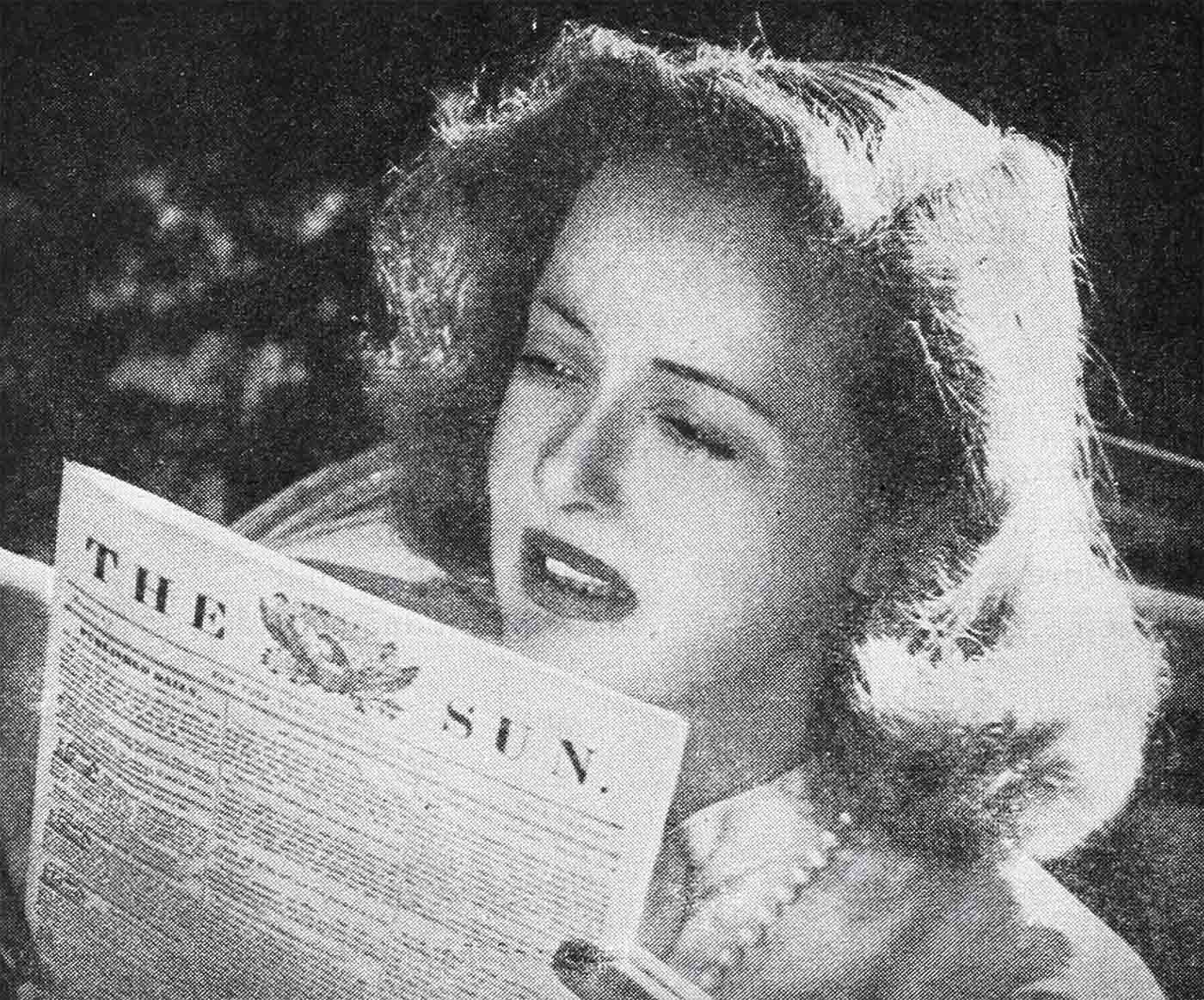
Bitter Choice—Bette Davis
Bette Davis has never faced a graver or more complex drama in the movies than she now faces in her private life. Her new movie, “The Story of a Divorce,” is pale stuff compared to her divorce from William Grant Sherry. For here is a situation so loaded with drama and fear and, yes, violence, that even a fiction writer might balk at the psychological elements involved.
The three characters are: Bette, a world-famous actress and brilliant woman who lives in the spotlight of acclaim. “Sherry,” a former boxer and masseur, now struggling for recognition as an artist. Barbara, called “Beedee,” the three-year-old daughter whose happiness lies in the balance.
The problem: Even with their marriage shattered around them, Sherry will not let Bette go. He wants her, the glitter and enchantment of her fascinating world and the attention and attentions he commands as her husband.
It might be said that it is commendable for a man to so love a woman that he cannot bear to lose her. But is it commendable for a man to use his fists to prove his love until, and I can tell you this first-hand, his wife is so terrified she goes nowhere without a bodyguard?
The last person upon whom Sherry used his active fists was Barry Sullivan. When, uninvited and overwrought, he barged into the studio party Bette’s company gave to celebrate her birthday, Barry tried to pacify him. In vain. A scuffle followed.
It was a few days after this that Bette, with her sister Barbara, came to see me. “You’ll have to excuse me for being so late,” she said. “I am so nervous that I am practically living on sedatives my doctor gives me.”

When I said her lateness was understandable, she went on in her hurried, clipped, brisk way, “I know I must not talk too much. My lawyer, Jerry Geisler, has advised me to say nothing. But you are a very old friend. I can trust you.”
Sherry has aired his troubles. He has told how he would have dinner ready for Bette, bring her slippers, press her dresses, draw her bath, give her massages. “I took the blame before,” he announced, “but this time I’m going to tell my side of it.”
Bette absolutely refuses to answer her husband’s blasts. It is her attitude that his intimate accusations are not to be dignified by denials.
However, I happen to know that the things Sherry is now saying are in direct contradiction to the things he said to the editors of Photoplay when they were entertained by Bette and him last February at the time of the Gold Medal dinner.
“It was Bette who saved our marriage,” he said, referring to their previous separation. “She had the intelligence to know what should be done to give me the help I needed.”
Those who heard him wondered if he was referring to the psychiatric treatment he had received or the interest Bette had taken in his painting career. She did not spare time, money or effort to put over his show. That it was not a success, certainly, was not her fault.
Until this last hassel it looked as if Bette and Sherry were going to make a go of their reconciliation. She’s been like her old self. She’s looked better than she did for a long time—dressed better too. She has her old interest back. At Ciro’s, where Ella Logan was singing, she sent back a note requesting “Ole Devil Moon.” She danced every dance.
It was, you’ll remember, last October that Bette asked the court in Santa Ana, a small town near Laguna Beach where she has her home, to put Sherry under a restraining order. Until then no one knew there had been any trouble. It is Bette’s way to keep her troubles to herself. So it was out of the blue, so to speak, that she filed for divorce and asked protection.

Sherry admitted Bette’s charge that he had such an ungovernable temper he made her life miserable. He also admitted that she was in deadly fear that he would do her bodily harm. He begged for another chance saying he would try to solve his problems through an analyst.
“Why did you take him back?” I asked.
“His analyst asked that he have another chance. Also I loved him. And I thought a reunion would be better for Barbara.”
Bette’s and Sherry’s devotion to their daughter undoubtedly has been a strong bond between them. Barbara’s an enchanting little blonde girl as healthy and natural as can be.
Bette wants her to grow up naturally. She tells about the elegant English nurse she asked to find other employment because always this nurse insisted upon knocking on the kitchen door and saying, “Cook may Barbara and I come into your kitchen?”
“I tried to explain that I wanted Barbara to feel every room in this house was part of her home, and she was welcome everywhere, always!” Bette explained.
There is no doubt that for a time Bette land Sherry managed to get on. Then it was the same old thing all over again. For instance. . . .
Lew Wasserman, one of the officials of Bette’s business representatives, Music Corporation of America, gave a party at his home. Bette and Sherry attended. In the course of the evening something angered the high-tempered gentleman and he started a battle. According to someone who overheard the whole bitter fight, Sherry threatened Bette and she, terrified, said the best thing to do was to leave with him, which she did.
The party at the studio when Sherry burst in and fought with Barry Sullivan was the last straw.
“Why did you leave with him?” I asked.
“I was advised to,” Bette said. “It seemed best. I didn’t want a scandal.”
“Surely, this time you are determined to go through with your divorce,” I said.
“Yes,” she replied, “it’s the only way. I must have peace of mind. But, more important, is Barbara. It is so awful and frightening for a little girl to grow up in such an atmosphere.”
“Why did you ever marry a man so far removed from your world?” I asked.
Bette sighed. “Sherry has many nice qualities,” she said. “He loves a home and he loved me. And, I, too, loved him.”
“But when you were in constant fear, why didn’t you break up your marriage?”

“Pride,” Bette said, “Good old New England pride. But that’s all over. Now I want my freedom. I want peace and happiness for my child and myself.”
When she was making her final pictures on her Warner contract I heard everywhere about her temperament and how difficult she was being. I can understand that. Business troubles and marriage troubles at the same time are almost more than anyone should have to take.
Well, one thing is for sure. Her professional worries are at an end. I wish you could have seen the way her face lighted up when she told me about “The Story of a Divorce.” She considers it the best thing she has done in years.
It is apparent that Bette has never wanted to be difficult. She loves her work too much. She didn’t mind in the least that she was having just twenty-four hours off between the finish of “Divorce” and the start of “All About Eve.”
“Isn’t that pretty strenuous?” I asked.
“Oh, no. Work is a solace. I am so happy that I have all this now.”
I watched Bette sipping black coffee and thought, “She has hit her stride again.”
She is the old Bette, a determined woman fighting for her child, her career and her happiness. But she’s an older and wiser Bette, too, the emotional actress always, but with a difference.
All her marriages have ended in tragedy. Harmon Nelson she married when she was young. She was desperately in love with him but the strict demands of her soaring career came between them.
Her second husband was Arthur Farnsworth, a New Englander, and a friend of her family. He was much older than she and I always thought their marriage was based on companionship. “Farnie” died after they were married a few years. She mentions him with genuine affection.
“Bette,” I said, “your lawyer cannot object to your answering one question for me. Will you ever marry again?”
“Not unless I meet a man who would be good to Barbara and someone she loved and who loved her. She is first in my life. I will be very happy with her and with my work. I am a lucky woman to have these two wonderful things in my life.”
And I say that all of us who have long admired the one and only Bette Davis are lucky to have her back, a woman free to give herself completely to her art again.
THE END
—BY LOUELLA O. PARSONS
It is a quote. PHOTOPLAY MAGAZINE JULY 1950





No Comments